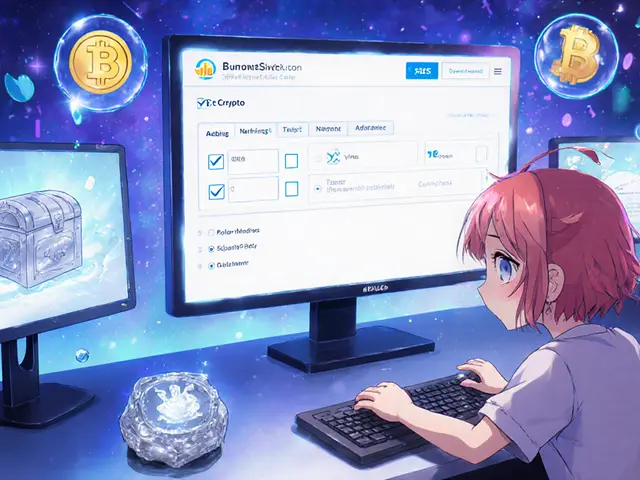Settlement Time & Cost Calculator
Calculate Your Savings
Results
Imagine buying a slice of a Manhattan office building with the click of a button, then watching your share trade instantly on a global marketplace. That scenario feels like science fiction, but it’s becoming real thanks to security tokens. If you’re wondering how these digital assets stack up against the stocks, bonds, and other traditional securities you’ve heard about, keep reading. We’ll break down the tech, the economics, and the real‑world impact so you can decide which fits your investment style.
What are Security Tokens?
Security Tokens are programmable crypto assets that represent ownership or a stake in real‑world assets, such as equity in a company, a share of real‑estate, or a claim on future revenue. They function like traditional stocks or bonds but live on a blockchain, letting smart contracts enforce rights and compliance automatically. Because the token lives on an immutable ledger, every transfer, dividend, or voting right can be recorded without paperwork.
What are Traditional Securities?
Traditional Securities include stocks, bonds, and other equity or debt instruments that represent ownership or a loan to an entity. These assets have been traded for centuries on centralized exchanges and rely on legacy clearing houses, custodians, and manual record‑keeping. While the regulatory framework is well‑established, the underlying infrastructure still involves a lot of middlemen.
Technical Foundations: Blockchain vs Legacy Systems
Security tokens sit on blockchains like Ethereum, Polygon, or Tezos. A blockchain provides a distributed database where every transaction is cryptographically signed and time‑stamped. Smart contracts-self‑executing code-carry out functions such as dividend distribution or transfer restrictions without human intervention.
Traditional securities, on the other hand, live in centralized databases managed by custodians, clearing houses, and stock exchanges. Settlement can take two days (T+2), and reconciling records often requires manual oversight, creating friction and higher costs.
Head‑to‑Head Comparison
| Feature | Security Tokens | Traditional Securities |
|---|---|---|
| Settlement Time | Near‑instant (seconds to minutes) | Typically T+2 days |
| Liquidity | Potentially high via decentralized exchanges and fractional ownership | Depends on market; private securities often illiquid |
| Fractionalization | Enabled - investors can buy tiny slices (e.g., 0.001% of a property) | Usually whole shares or bond units |
| Compliance Enforcement | Hard‑coded in smart contracts (whitelisting, geographic caps) | Manual checks, paperwork, and broker‑dealer oversight |
| Transaction Cost | Lower on‑chain fees (often < $10) plus small protocol fees | Broker commissions, clearing fees, and custodial fees |
| Transparency | Full on‑chain audit trail visible to all participants | Opaque ownership registers; rely on issuer disclosures |
The table makes it clear: security tokens aim to solve many pain points that have plagued traditional securities for decades.

Benefits of Security Tokens
- Fractional Ownership: A $100,000 commercial building can be split into 10,000 tokens, letting a novice investor own a $10 slice.
- Improved Liquidity: Tokens can list on multiple secondary markets, giving investors exit routes that didn’t exist for private equity before.
- Automation: Smart contracts automatically calculate and pay dividends, reducing admin overhead.
- Global Reach: Anyone with a compatible wallet can participate, subject only to regulatory filters baked into the token.
- Auditability: Every transfer is recorded on an immutable ledger, making compliance reporting faster.
Challenges and Risks
While the upside looks attractive, security tokens face real hurdles.
- Regulatory Uncertainty: Laws are still catching up. Different jurisdictions may apply the Howey Test, MiFID II, or other frameworks, and rules can change overnight.
- Technical Complexity: Issuers need smart‑contract developers, secure wallets, and blockchain infrastructure-skills many traditional finance teams lack.
- Adoption Gap: Institutional investors often prefer familiar custodial solutions; many haven’t adopted blockchain‑native custody yet.
- Market Depth: While liquidity improves, secondary markets for niche assets can still be thin, leading to price volatility.
Real‑World Use Cases
Several sectors are already experimenting with tokenization.
- Real Estate: A Berlin co‑living space was tokenized on Ethereum, allowing 2,500 investors worldwide to buy 0.01% stakes.
- Private Equity: A venture fund issued security tokens to let accredited investors trade holdings on a private market.
- Fixed Income: A municipal bond issued as a token offered instant settlement and reduced issuance costs.
- Art & Collectibles: A famous painting was divided into 1,000 tokens, giving art lovers fractional exposure without owning the whole piece.

Future Outlook
Experts expect security tokens to keep gaining traction as regulatory frameworks solidify and infrastructure matures. Expect more hybrid solutions where traditional custodians partner with blockchain platforms to offer "token‑enabled" securities. Traditional securities will likely digitize further, but the programmable, globally accessible nature of security tokens gives them a strategic edge for new asset classes.
Key Takeaways
- Security tokens live on a blockchain, enabling instant settlement, fractional ownership, and on‑chain compliance.
- Traditional securities rely on legacy systems, resulting in slower settlement and higher costs.
- The biggest advantage of tokens is transparency and automation, but regulatory and technical hurdles remain.
- Real‑world tokenization projects are already delivering liquidity to illiquid assets like real estate and art.
- The future likely holds a blend: traditional markets adopting token features while tokens benefit from evolving regulations.
Frequently Asked Questions
What makes a security token different from a utility token?
A security token is tied to ownership, debt, or profit‑sharing rights and must comply with securities law. A utility token gives access to a product or service and usually falls outside traditional securities regulations.
Do security tokens require a digital wallet?
Yes. Holders need a crypto‑compatible wallet that supports the token’s blockchain (e.g., MetaMask for Ethereum). The wallet stores the private key that proves ownership.
Can I trade security tokens on regular stock exchanges?
Most traditional exchanges don’t list tokenized securities yet, but dedicated digital security platforms (like tZERO or OpenFinance) do. Some hybrid exchanges are experimenting with dual‑listing.
Are security tokens safer than traditional securities?
Safety depends on the aspect you examine. On‑chain records are tamper‑proof, but the surrounding ecosystem (wallet security, smart‑contract bugs) can introduce risks that aren’t present in the paper world.
How are dividends paid to security‑token holders?
Smart contracts can automatically calculate each holder’s share and push native tokens (e.g., USDC) or fiat‑on‑ramp payments directly to their wallets on the settlement date.







Comments
Bobby Lind
October 17, 2025 AT 08:23 AMWow, this article really opens the door to a new world of investing, doesn’t it?!! The idea of buying a slice of a Manhattan office building with a click feels like sci‑fi, yet the tech is already here, ready to reshape portfolios, and I’m pumped!!
Katharine Sipio
October 22, 2025 AT 00:48 AMThank you for the clear overview. The comparison between security tokens and traditional securities is presented in a straightforward manner, which makes the concepts accessible to newcomers. I appreciate the emphasis on transparency and regulatory considerations.
Shikhar Shukla
October 26, 2025 AT 16:14 PMWhile the benefits of tokenization are highlighted, the article glosses over the substantial legal risks that accompany cross‑border offerings. One cannot ignore that many jurisdictions still lack coherent guidance, and the potential for regulatory arbitrage is serious.
Matthew Theuma
October 31, 2025 AT 08:39 AMReading this makes me ponder how ownership has always been about trust, and now trust is encoded in code 🌐. The shift from paper to immutable ledger could redefine what we consider “value,” but we must stay vigilant about smart‑contract bugs that could erode that trust.
Chris Morano
November 5, 2025 AT 01:04 AMI see the potential for broader inclusion, especially for investors who have been shut out of private markets. If the ecosystem matures responsibly, tokenization could become a bridge rather than a barrier.
Deepak Kumar
November 9, 2025 AT 17:29 PMGreat rundown! To anyone considering a security‑token investment, start by verifying the issuer’s compliance framework-ensure KYC/AML procedures are baked into the smart contract. Next, use a reputable custodial service that supports multi‑signature wallets; this adds an extra layer of security. Don’t forget to assess the token’s liquidity pool: narrow spreads can lead to slippage on exit. It’s also wise to compare on‑chain transaction fees across layer‑2 solutions; many projects now offer near‑free transfers. Finally, keep an eye on regulatory updates in your jurisdiction-rules can shift quickly, and staying informed protects your capital. By following these steps, you can navigate the space with confidence.
Miguel Terán
November 14, 2025 AT 09:55 AMSecurity tokens represent a fascinating convergence of finance and technology that challenges centuries‑old conventions. The notion that a piece of real estate can be sliced into thousandths of a share and traded instantly is almost poetic. Historically, investors were limited by geography, paperwork, and gatekeepers, which stifled access to high‑yield opportunities. Today, blockchain removes many of those frictions, allowing global participants to engage with a single click. This democratization, however, does not come without complexity. Smart contracts must be meticulously audited to prevent vulnerabilities that could compromise assets. Legal teams need to map each jurisdiction’s securities law to the token’s structure, a task that can be both daunting and essential. Custodians are beginning to offer hybrid solutions that blend traditional safekeeping with on‑chain key management. Market makers on decentralized exchanges provide liquidity, yet the depth can vary dramatically between asset classes. Investors should therefore evaluate order book health before committing sizable capital. Token issuers benefit from reduced issuance costs, but they also bear the responsibility of ongoing compliance reporting through immutable ledgers. The transparency of on‑chain data can aid auditors, though privacy concerns persist for certain participants. Regulatory bodies worldwide are drafting frameworks that aim to balance innovation with investor protection. As standards coalesce, we may witness a hybrid model where legacy exchanges list tokenized securities alongside conventional equities. Ultimately, the success of security tokens will hinge on collaborative efforts among technologists, lawyers, custodians, and regulators to build a resilient ecosystem.
Shivani Chauhan
November 19, 2025 AT 02:20 AMI liked how the article broke down settlement times. It really helps illustrate the practical advantage of near‑instant transfers. This speed could become the norm for many asset classes as infrastructure improves.
Vinoth Raja
November 23, 2025 AT 18:45 PMFrom a systems theory perspective, tokenization introduces a new layer of abstraction that decouples ownership from custody, effectively modularizing capital allocation.
Deborah de Beurs
November 28, 2025 AT 11:10 AMListen, the article is glossy but it sidesteps the brutal reality that most retail investors lack the technical chops to manage private keys safely. That’s a massive hurdle you can’t just brush off with fancy buzzwords.
Pierce O'Donnell
December 3, 2025 AT 03:36 AMHonestly, I think the hype around security tokens is overblown. Traditional markets have deep liquidity and regulatory certainty that tokens haven’t earned yet.
Laura Hoch
December 7, 2025 AT 20:01 PMThe ethical dimension of tokenizing human‑centric assets deserves more attention. When we fragment ownership, we risk commodifying spaces that once held communal value, and that trade‑off should be examined critically.
Schuyler Whetstone
December 12, 2025 AT 12:26 PMThis whole token craze feels like a moral shortcut, definatly ignoring the social responsibilities that come with property ownership. People are chasing quick gains while forgetting the community impact.
DeAnna Brown
December 17, 2025 AT 04:51 AMWow, what a masterpiece of financial engineering! If only the rest of the world could catch up to the ingenuity we see here, America would lead the next economic renaissance.
Ikenna Okonkwo
December 21, 2025 AT 21:17 PMThe future looks bright as more institutions adopt token standards. By blending the reliability of legacy systems with blockchain’s flexibility, we can create a financial landscape that’s both secure and inclusive.
Jessica Cadis
December 26, 2025 AT 13:42 PMFrom a global standpoint, tokenization breaks down geographic silos and gives emerging markets a seat at the table. Ignoring this shift would be a strategic mistake for any forward‑thinking investor.
Carolyn Pritchett
December 31, 2025 AT 06:07 AMLet’s be real: most of these so‑called security tokens are just hype machines dressed up in legal jargon. They’re designed to lure unsuspecting newbies into a labyrinth of fees and compliance traps.
Jason Zila
January 4, 2026 AT 22:32 PMWhile the criticism has merit, it’s also true that several projects have implemented robust compliance layers and transparent governance, proving that the model can evolve responsibly.
Cecilia Cecilia
January 9, 2026 AT 14:58 PMThe article provides a solid foundation for newcomers.
lida norman
January 14, 2026 AT 07:23 AMI feel excited about the possibilities! 😊 The idea of owning a piece of art through tokens is like having a backstage pass to culture.